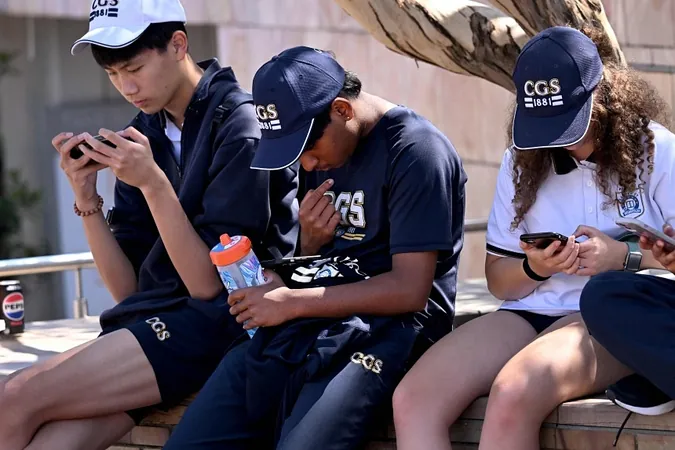
Australia Enforces Groundbreaking Social Media Ban for Minors: A New Era for Tech Regulations?
2024-11-28
Author: Wei Ling
Australia’s Landmark Law
In a landmark decision, Australia has passed a controversial law on November 28th that bans social media access for children under the age of 16. This move has sparked intense debate and is poised to create a ripple effect across the globe, establishing Australia as a frontrunner in regulating Big Tech.
The Social Media Minimum Age Bill
The newly enacted Social Media Minimum Age Bill compels major tech companies, including Meta (the parent company of Facebook and Instagram) and TikTok, to prohibit minors from accessing their platforms. Failure to comply may result in hefty fines, reaching up to A$49.5 million (approximately US$30 million). As part of the implementation plan, trials focused on enforcing this ban are set to commence in January 2025, with the full restrictions slated for rollout within a year.
Concerns Over Mental Health
This legislation arises amid growing concerns over the mental health effects of social media on young users. Prime Minister Anthony Albanese, leading his centre-left government towards the next election in 2025, has positioned this law as a significant political victory. Despite facing opposition from privacy advocates and child rights groups, 77% of Australians expressed support for the ban, according to recent polls.
Australia’s Unique Stand
Internationally, Australia’s action stands out as it is one of the most stringent regulations targeting social media access for minors. While some countries like France and certain U.S. states have implemented age restrictions that allow for parental consent, Australia’s ban is absolute and non-negotiable, marking a more aggressive stance against tech companies.
Implications for International Relations
This legislative measure is expected to complicate Australia’s relations with key allies, particularly the United States. Prominent figures, including Elon Musk, have criticized the law, suggesting it is a covert method to regulate internet access more broadly.
Industry Response
The reaction from social media companies has been mixed. A spokesperson for Meta acknowledged their respect for Australian law but raised concerns about the rushed legislative process that overlooked vital considerations, including industry efforts to create age-appropriate online experiences. There have also been calls for proper consultation to ensure that the application of these laws does not overly burden families.
Youth Advocacy Concerns
Concerns regarding the potential negative fallout of the ban have been pointed out by youth advocacy groups. Critics argue that this could alienate vulnerable teens from crucial support networks, such as LGBTQIA and migrant communities. Additionally, there are fears that the law could pave the way for invasive personal data collection and state surveillance under the guise of enforcing age restrictions.
Divided Public Opinion
The bill passed amid mixed sentiments, reflecting a divided opinion within the nation. While some parents and advocates assert that the decision represents a crucial step towards safeguarding children’s mental health, others warn that it may inadvertently push youth toward more hidden and potentially harmful corners of the internet.
Youth Perspectives
Many young Australians have voiced their apprehensions about the ban, stating that it might create an underground network of tech-savvy youth who find ways to bypass restrictions. As 16-year-old Sydney student Enie Lam put it, "A total ban may drive young people to less visible, more dangerous parts of the internet."
Looking Ahead
As the world watches Australia’s next steps, this bold move could set a precedent for other nations grappling with the balance between protecting young minds and safeguarding their rights to digital access. With digital landscapes constantly evolving, will this law truly achieve its intended effect, or will it lead to new challenges in youth engagement online? The conversation is far from over.
 Brasil (PT)
Brasil (PT)
 Canada (EN)
Canada (EN)
 Chile (ES)
Chile (ES)
 España (ES)
España (ES)
 France (FR)
France (FR)
 Hong Kong (EN)
Hong Kong (EN)
 Italia (IT)
Italia (IT)
 日本 (JA)
日本 (JA)
 Magyarország (HU)
Magyarország (HU)
 Norge (NO)
Norge (NO)
 Polska (PL)
Polska (PL)
 Schweiz (DE)
Schweiz (DE)
 Singapore (EN)
Singapore (EN)
 Sverige (SV)
Sverige (SV)
 Suomi (FI)
Suomi (FI)
 Türkiye (TR)
Türkiye (TR)